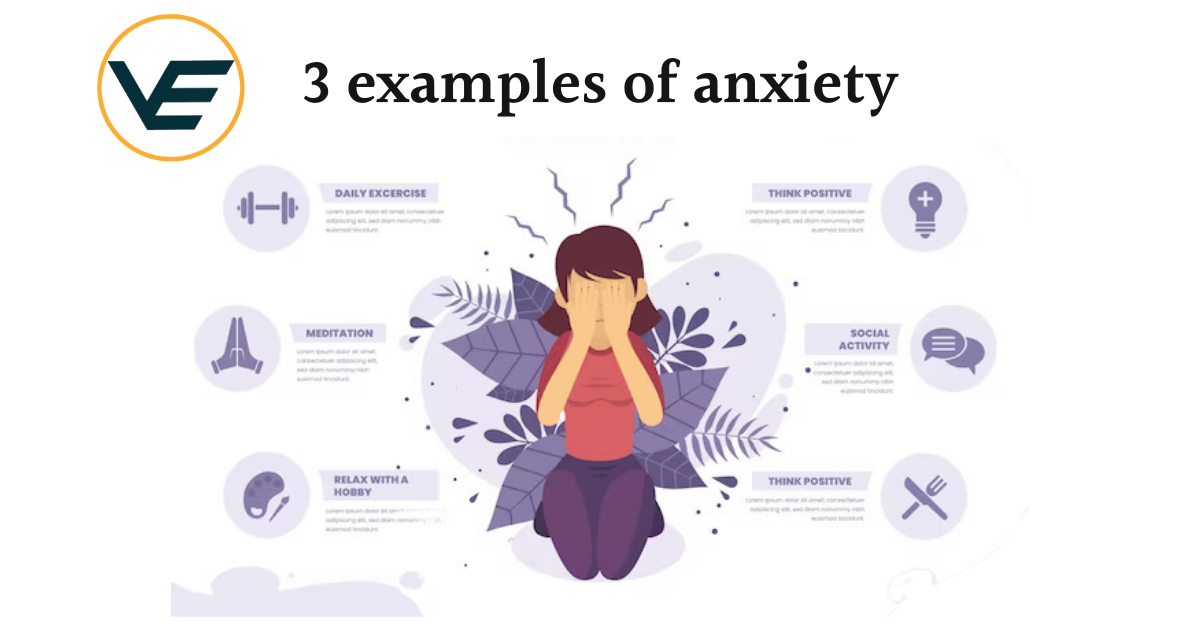Anxiety is a common and natural human response to stress and perceived threats. It is a normal emotion that everyone experiences at some point in their lives. When faced with challenges or uncertain situations, it is natural to feel anxious. However, for some individuals, anxiety can become overwhelming and interfere with their daily functioning, leading to an anxiety disorder.
Examples of Anxiety How it Can Affect an Individual
Anxiety can affect individuals in various ways, and here are three examples of how it can impact someone:
- Emotional Distress: Anxiety can lead to intense and persistent feelings of fear, worry, or unease. Individuals may experience overwhelming emotions that interfere with their daily activities and relationships. They might feel constantly on edge, struggle to relax, or have difficulty concentrating due to anxious thoughts and feelings.
- Physical Symptoms: Anxiety can manifest in physical symptoms, such as increased heart rate, sweating, trembling, muscle tension, and gastrointestinal issues. These symptoms can be distressing and may mimic other health conditions, leading to further stress and uncertainty for the affected individual.
- Social Isolation and Avoidance: Anxiety can lead individuals to avoid situations or environments that trigger their anxious feelings. This avoidance behavior may lead to social isolation, as individuals withdraw from social interactions and activities they once enjoyed. Over time, this can impact their relationships and quality of life.
3 Examples of How Anxiety Can Turn Life into a Rollercoaster Ride
Ah, anxiety – that unwelcome guest that shows up without an invitation and overstays its welcome. We’ve all felt it at some point, that jittery feeling that turns your stomach into a gymnastics arena. Let’s take a peek at how anxiety can sneak into our lives and wreak a bit of havoc.
The Social Butterfly Takes a Hit
Meet Sarah, our resident social butterfly. She’s usually the life of the party, the one with a laugh that could light up a room. But lately, anxiety decided to play party crasher. Now, Sarah finds herself overthinking every social interaction. Did she say something weird? Did people notice her nervous fidgeting? Anxiety has turned her into a social detective, searching for clues of awkwardness where none exist.
If anxiety were a person, it would probably be that one friend who always brings up embarrassing childhood stories at family gatherings.
The Workplace Worry Wart
Dave, the guy with the killer spreadsheets and an uncanny ability to make coffee disappear, is usually on top of his game. But anxiety decided to join Dave’s daily grind uninvited. Suddenly, every email ping feels like a surprise test, and every meeting is an interrogation. Dave’s brain is working overtime, imagining worst-case scenarios that make a Marvel superhero plot seem like child’s play.
Humorous observation: If anxiety were a co-worker, it would be that one who hogs the office snacks and leaves passive-aggressive notes about fridge etiquette.
The Midnight Thought Marathon
Meet Emily, the night owl who used to conquer late-night Netflix binges effortlessly. But anxiety decided to join her nocturnal adventures. Now, instead of peacefully dreaming about winning the lottery (or at least finding matching socks), Emily’s mind is running a marathon of worries. “Did I forget to lock the door?” “Did I send that email?” Anxiety has turned her bed into a battlefield of restless thoughts.
Tongue-in-cheek comment: If anxiety were a nocturnal creature, it would probably be a caffeine-fueled owl with a subscription to conspiracy theories.
It is important to note that anxiety affects individuals differently, and the severity of its impact can vary. Some people may experience mild anxiety, which does not significantly disrupt their daily lives, while others may struggle with severe anxiety that requires professional intervention and support. Understanding and addressing anxiety is essential for promoting mental well-being and offering appropriate help to those in need.

